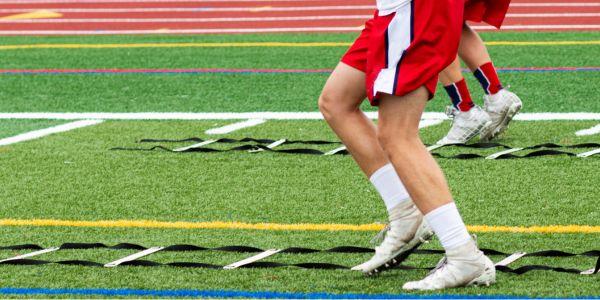Benefits of Participating in Youth Sports
Research shows exactly why young athletes should stay in sports.
That’s the word from Paul Caccamo, the Harvard-educated executive director of Up2Us, a national coalition of community sports programs that teaches young athletes life lessons.
“Sports are more than a game; they are a set of life lessons. Kids growing up without them are really disadvantaged,” he says.
The statistics tell you all you need to know about the advantages of participating in athletics, says Caccamo, who received one of Harvard’s most prestigious graduate awards for innovation in social-service program design.
“Kids who participate in sports attend school more, are more community and civic minded, get in less trouble, and tend to be more successful in the workplace. They have done studies from corporate leaders in the country: The number who made honor role was less than 20% but those who played sports was 70% – 80%.”
Young athletes learn to work together, acquire leadership skills, get a sense of discipline and learn communication skills, Caccamo says. “All of these things are keys to success in the workplace.”
So how do you ensure your kids get all these benefits by staying in sports?
To understand why children and teens stay in sports, you have to understand why they drop out.
The Number One reason: They’re not having any fun.
Kids often join sports teams to be with friends and enjoy themselves, but at some point become overwhelmed by the pressure and the focus on winning.
To help ensure your kids stay in sports and enjoy the many benefits:
- Be sure to separate your dreams from your child’s. Sometimes parents have different ideas about what they want from their child’s sports experience. These ideas can undermine their child’s experience.
- Keep your expectations in check. Kids often take on your expectations as their own, and if they don’t achieve them, lose confidence.
- Help kids manage their own expectations. If a young athlete begins a basketball game expecting to score 24 points, he’s likely to feel frustrated and disappointed.
- Choose coaches and teams carefully. Be sure to interview potential coaches about their philosophy. It’s best, especially when children are younger, if coaches focus more on skill-building and on having fun than on winning.
We’ve got many more resources for ensuring your young athletes stay in sports and enjoy its many benefits at Kids Sports Psychology
Our resources include e-books written for both parents and young athletes, including:
- Ten Ways of Thinking That Hurt Kids’ Confidence (for sports kids)
- Post-Game Checklist for Parents: Boosting Kids’ Confidence
- Focus to the Max! (for sports kids)
You can also download audio and video programs that help you and your young athletes get the most out of taking part in youth sports. They include videos you can watch with your children and interviews with experts like Caccamo.
Related Articles on Kids’ Mental Game:
- How Participating in Sports Gives Kids an Edge in Life
- Why Kids’ Identities Shouldn’t be All About Sports
- Getting All the Goodness Out of Youth Sports
*Subscribe to The Sports Psychology Podcast on iTunes
*Subscribe to The Sports Psychology Podcast on Spotify
Improve Your Mental Game From Anywhere In The World

We’re certain that, as a parent, you want to help your child develop confidence and discipline in sports and life. And as a sports parent, you’d love for your children to reach their potential in sports. But encouraging your child to strive for greatness without pressuring them can be a challenge.
You can get expert mental coaching with us from anywhere. Meet with us via Zoom, Skype, FaceTime or phone call. With today’s video technology, we are able to connect with athletes and coaches all over the globe.
Call Us Today to Schedule Your Free 15-Minute Session.
Find Out How Your Athlete Can Benefit From One-on-One Mental Coaching!


it is always true that better communication is enjoy through sports. Also, team building and emotional benefits were enjoyed and developed. therefore sports makes them happy
hello
I am from greendale middle school in Milwaukee Wisconsin. I support Sports for youth and Your website. I personally think that there should be alot more sports programs for children of all ages. Are you aware of any studys the support youth sports.
Raymond R.